
Finding the best laptop for family use can be a challenging task, as the needs of every family member can differ significantly. From working on school assignments and office projects to enjoying movies, gaming, and connecting with friends and family, an ideal family laptop should cater to a diverse range of requirements. As someone who has spent countless hours researching laptops and their specifications, I'm here to help you navigate the complex world of laptop selection and find the perfect device for your household.
In my extensive search for the best laptops, I review and compare the latest releases by examining their specs and user experiences, taking into consideration both professional and user-generated reviews. For a family laptop, it's crucial to prioritize versatility, durability, and performance. This process involves identifying laptops that can handle multiple tasks, withstand everyday wear and tear, and offer a smooth user experience for all family members.
When selecting the best laptop for family use, it's essential to consider the unique preferences and requirements of each individual. For instance, a high-resolution display and powerful graphics card are vital for those who enjoy gaming or watching movies, while a comfortable keyboard and reliable processor are important for productivity tasks. Furthermore, parental controls and security features should not be overlooked to ensure a safe and enjoyable computing experience for every family member. With these factors in mind, you can confidently choose the perfect laptop that meets the diverse needs of your family.
Power Up Your Family's Needs: Processor Guide
When looking for a laptop processor for family use, there are many options available on the market. Apple has released MacBooks with ARM-based M1, M2, M2 Pro, and M2 Max system-on-chip modules that offer exceptional single-core performance and battery life. AMD has captured 20% of the laptop CPU market, with plenty of notebooks equipped with 6th and 7th-generation Ryzen CPUs. Meanwhile, Intel has already released its 13th-generation Core processors, but 12th-generation Core CPUs can still provide a lot of value, especially if you don't need cutting-edge performance.
When it comes to family use laptops, you don't necessarily need a high-end CPU, unless you're a gamer or content creator. However, the processor is one of the most important components in a laptop since it has a significant impact on performance and battery life. It's best to compare processors by looking at benchmark scores such as PassMark and Cinebench, but keep in mind that these tests don't account for other factors such as cooling or power delivery.
For an affordable option that still delivers solid performance, look for an AMD Ryzen 5 or Intel Core i5 processor. These will be more than enough for most daily tasks including some gaming and video editing (though not 4K). If you're willing to invest more, the Intel Core i7-11370H offers top-tier performance.
Here are our recommended processors based on each price bracket:
| Price Range | Recommended Processor |
|---|---|
| Minimum | Intel Core i3-1115G4 |
| Recommended | Intel Core i5-1135G7 |
| High-end | Intel Core i7-11370H |
Ultimately, the right laptop processor for family use depends on your specific needs and budget. Consider what tasks you'll be using your laptop for, and how much performance you really need before making your decision.
Make Your Family's Laptop A Graphics Powerhouse
When it comes to family use laptops, a dedicated graphics card is not necessary. Integrated graphics are more than enough to handle daily tasks such as browsing the web, watching videos, and playing casual games. However, if you're looking for a gaming laptop or a laptop for creative work, a discrete GPU becomes necessary.
Nvidia dominates the laptop GPU market, and their graphics cards are the best choice for gaming laptops. AMD is also an option, but historically their GPUs have been inferior in terms of performance per watt. When comparing laptops with different graphics cards, using 3DMark benchmarks is an industry standard for comparing laptop GPUs. However, these tests might be too demanding and not representative of real-world gaming performance, especially for budget gaming laptops.
Here are my recommendations for laptop GPUs based on price range:
- Minimum: GeForce GTX 1650
- Recommended: GeForce RTX 3050
- High-end: GeForce RTX 2060
If you're looking for a high-end gaming laptop under $2,000, expect it to have a powerful CPU and GPU combo that won't bottleneck your system's potential. Remember, the GPU version matters much less than the model when it comes to gaming laptops. If you're on a budget or don't need all that power, an older generation GPU will suffice.
Memory Matters: How Much RAM is Enough for Your Family Laptop?
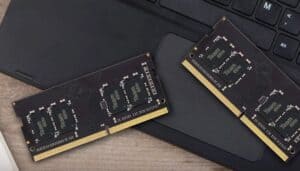
When it comes to choosing the right amount of RAM for a family use laptop, there are a few key things to keep in mind. First and foremost, it's important to consider what you'll be using the laptop for. If you're simply using it to browse the web, check email, and do some light word processing, 8 GB of RAM should be more than enough.
However, if you're using your laptop for photo management, such as with Lightroom or other similar software, you'll want to have at least 16 GB of RAM. This is because photo management software can be quite memory-intensive, especially when working with large files or multiple images at once.
When it comes to DDR4 vs. DDR5, it's worth noting that DDR5 is still quite new and expensive, and may not be worth the extra money unless you need the extra performance. DDR4 is still more than adequate for most people, and is much cheaper.
Other things to consider when picking RAM modules include the frequency, ECC, and CL/tCL timings. However, for most people, these factors won't be a major concern.
In terms of price, you can expect to pay more for laptops with higher amounts of RAM. Most mid-range laptops come with 16 GB of RAM, while high-end models may have 32 GB or more. For family use, we recommend a minimum of 8 GB of RAM, with 16 GB being the sweet spot for most users. If you're doing a lot of photo management or other memory-intensive tasks, consider going for a laptop with 32 GB of RAM or more.
Family Laptop Buying: Answering Your Questions!
Q: What is the best laptop for family use?
The ASUS Zenbook is a fantastic choice for family use. It's budget-friendly at just $640, and its hardware is excellent for basic productivity tasks and browsing the web.
What should I look for in a family laptop?
You should look for a laptop with a durable build quality, good battery life, and an adequate display size (14-16 inches). Additionally, choose a laptop with at least an i3-1115G4 processor and 8GB of memory to ensure smooth performance for everyday tasks.
How much should I spend on a family laptop?
The amount you should spend on a family laptop depends on your budget and usage requirements. For basic usage, you can get a budget-friendly laptop like the ASUS Zenbook for $640. For more demanding tasks, we recommend a higher budget of around $1,500-$2,000.
Which brand is the most reliable for family laptops?
Brands like ASUS, HP, Lenovo, and MSI have a reputation for manufacturing reliable laptops for family use. However, the reliability also depends on the specific model you choose.
Can a family share one laptop?
Yes, a family can share one laptop by creating separate user accounts on the same device. However, it might not be an ideal solution, especially if multiple family members need to use the laptop at the same time.
What are the essential features of a family laptop?
A family laptop should have a durable build quality, decent performance, a good battery life, and adequate storage. Additional features like a webcam, microphone, and speakers are also important for video calls and online classes.
Is a touchscreen laptop ideal for family use?
A touchscreen laptop can be useful for family use, especially for younger children who prefer a more interactive experience. However, it's not a necessary feature, and you can choose a non-touchscreen laptop to save costs.
What is the best budget laptop for family use?
The ASUS Zenbook is the best budget laptop for family use, priced at just $640. It has adequate hardware for basic productivity tasks and browsing the web.
Can a family laptop be used for work and school?
Yes, a family laptop can be used for work and school, provided it has adequate hardware to handle demanding tasks like video editing or software development.
What are the most important factors to consider when choosing a family laptop?
The most crucial factors to consider when choosing a family laptop are the build quality, performance, battery life, storage, and display size. Other factors like the price, brand reputation, and specific usage requirements should also be considered.
7 Best Laptops for family use
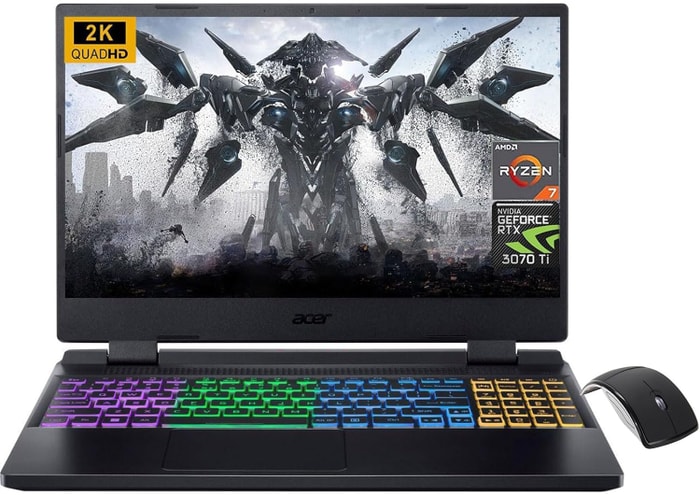 $680
$6801.acer Nitro 5
family use laptop- Awesome processor (Ryzen 7 6800H)
- Terrific graphics card (RTX 3070 Ti)
- One of most affordable laptops with an AMD Ryzen 7 processor
- Spacious 1TB SSD
- So-so memory amount (32GB)
- No IPS Panel (inferior color reproduction)
Alternatives
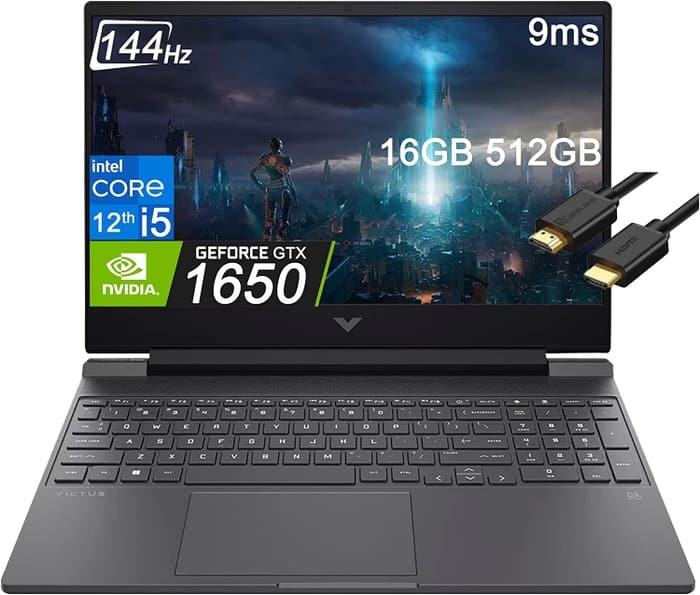
HP Victus 15t
- Low price
- Solid gaming performance
- Bad battery life
- Display and webcam could be better
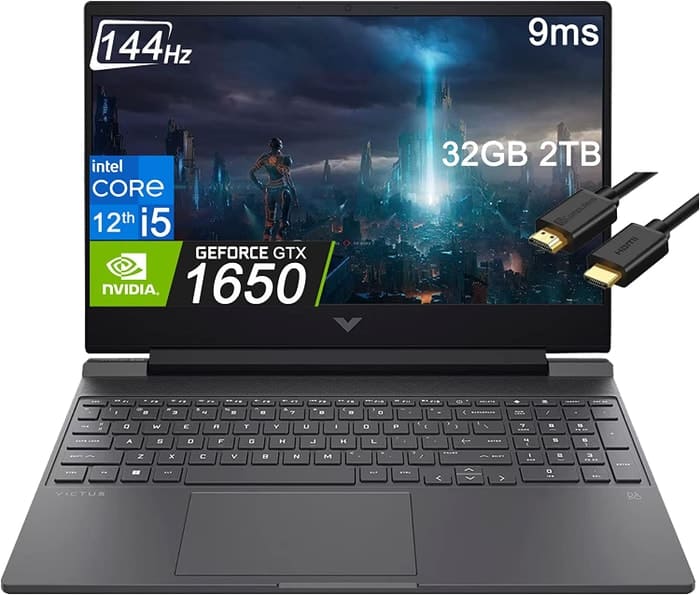
2.HP Victus 15
HP Victus 15: Affordable gaming laptop with solid performance, but lacks in battery life and design.- Excellent price
- Good gaming performance
- Can double as a work laptop
- Bad battery life
- Rather plain design
Summary
The HP Victus 15 offers excellent value for its price, with good gaming performance and the ability to double as a work laptop. However, its battery life is subpar and its design is rather plain.
Alternatives
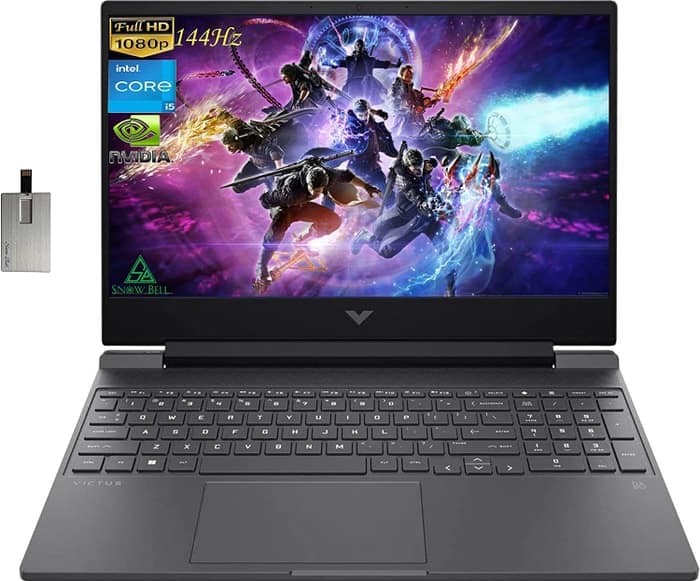
HP Victus
- Delivers smooth gameplay at 1080p.
- Fast SSD.
- No variable refresh rate (VRR) to reduce screen tearing.
- Some performance loss on CPU under load.

3.ASUS TUF Dash F15
The ASUS TUF Dash F15 is a well-balanced and competitively priced laptop for family use.- Lightweight and well-built
- Good variety of screen options
- Significantly more powerful than previous generation
- Competitively priced
- Some quirks affecting everyday ergonomics
- Most ports squeezed together on the left edge
- Be cautious of the FHD 144Hz screen option.
Summary
The ASUS TUF Dash F15 is a lightweight and well-built laptop that offers good performance and a variety of screen options. It is significantly more powerful than its previous generation and is competitively priced, making it a great option for families on a lower budget. Just be cautious of the FHD 144Hz screen option.
Reviews
Alternatives
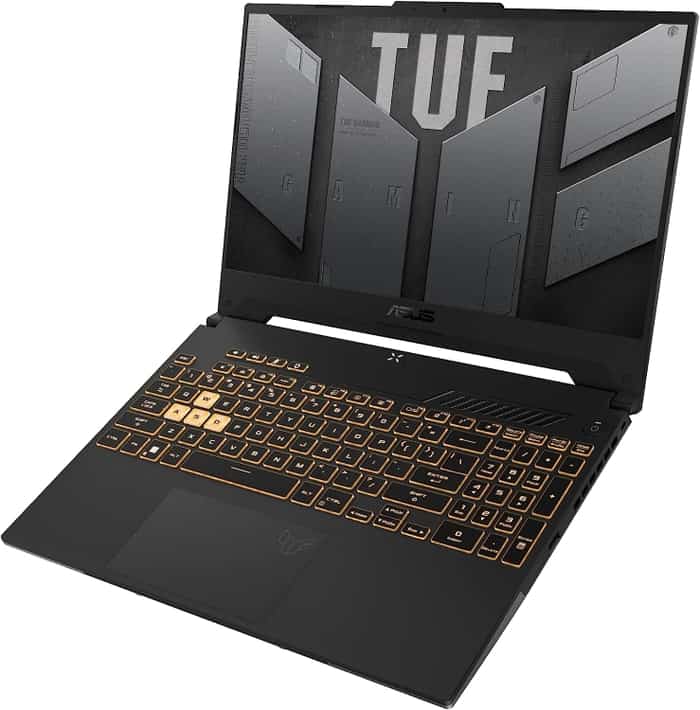
ASUS TUF F15 FX507VU-ES53
- Superb 1080p gaming
- Strong productivity capabilities
- Poor webcam, touchpad, and speakers
- Some games appear washed out on display

4.Lenovo Legion 5i Pro 16
Lenovo Legion 5i Pro: A powerful and stylish laptop with great performance and plenty of ports.- Stylish, sleek form factor
- Gorgeous display
- Strong performance
- Quiet fans
- Webcam quality is poor
- No biometric authentication
- Slightly slower SSD than competitors
Summary
The Lenovo Legion 5i Pro is a sleek and stylish laptop that offers strong performance and a beautiful display. It has plenty of ports and quiet fans, making it a great choice for family use.
Reviews
Alternatives
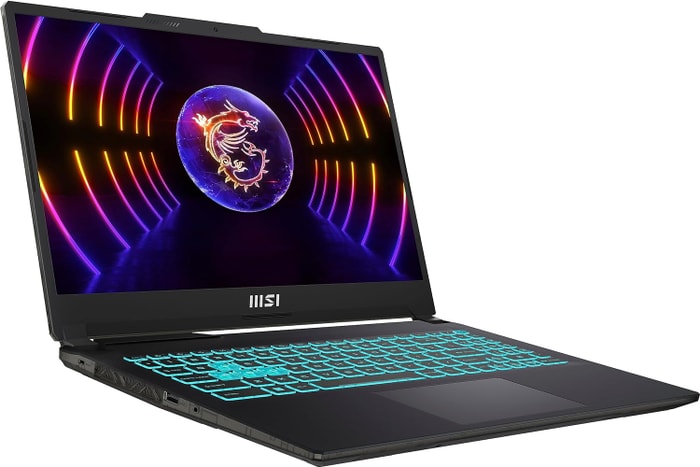 $1,430
$1,430MSI Cyborg 15
- Able to play at the highest 1080p settings
- Peppy processor for the money
- Display is dim and disappointing
- Sharp chassis edge can dig into wrists during typing
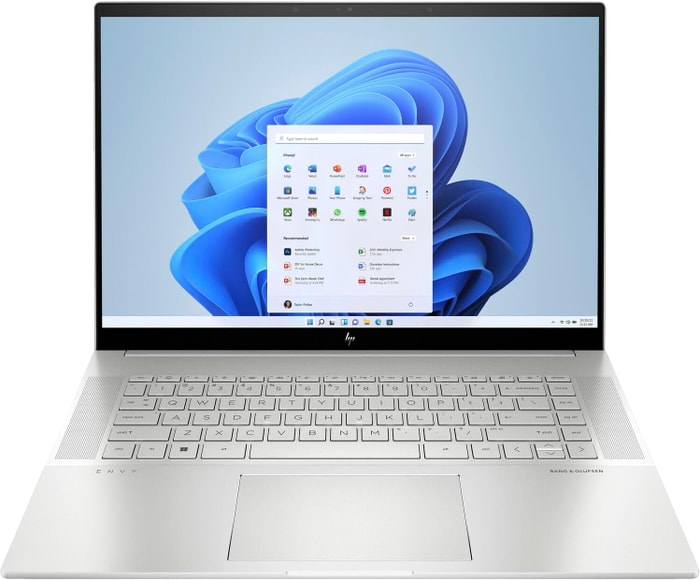 $1,800
$1,8005.HP Envy 16
HP Envy 16: A heavyweight desktop replacement with high-end features for creative apps and light gaming.- Plenty of CPU and GPU power
- New 120Hz screen refresh rate
- High-res webcam
- Sleek design
- Merely adequate base screen
- Optional OLED has fewer pixels than before
- Bulky and heavy
Summary
The HP Envy 16 offers plenty of CPU and GPU power, a new 120Hz screen refresh rate, and a high-res webcam, making it a great choice for creative apps and light gaming. However, it falls short with its merely adequate base screen, optional OLED with fewer pixels, and its bulky and heavy design.
Reviews
Alternatives

ASUS ROG Strix G15
- High-performance CPU and GPU
- Solid build quality and design
- Limited connectivity options
- Potential for coil whine in certain situations

6.Lenovo Legion Pro 7i 16
Lenovo Legion Pro 7i 16 offers impressive gaming performance at a reasonable price, but its keyboard deck and battery life leave something to be desired.- Strong overall performance
- Big, bright, and fast display
- Per-key RGB lighting
- Some flex to the keyboard deck
- Poor battery life
Summary
The Lenovo Legion Pro 7i 16 provides powerful gaming performance and a sleek design at a competitive price point. With its i9-13900HX processor and RTX 4090 graphics card, it delivers exceptional performance for the price. However, it does have some drawbacks such as a keyboard deck with noticeable flex and poor battery life.
Alternatives
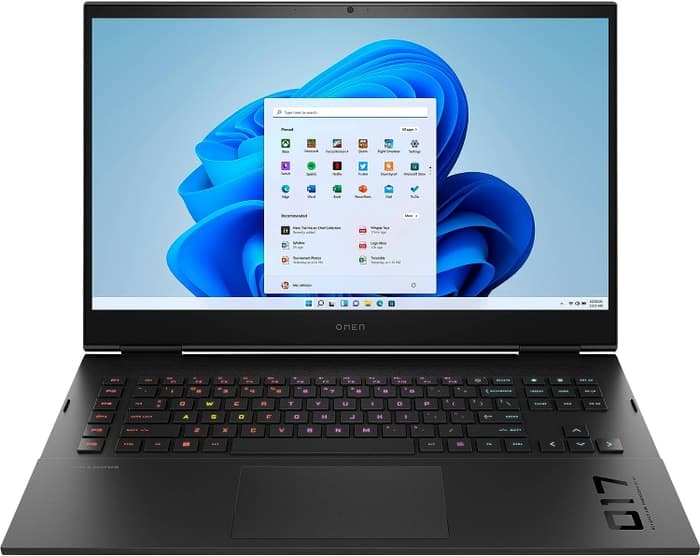
HP Omen
- Slim and relatively portable build
- Midrange gaming performance at a reasonable price
- All-AMD configuration is outpaced by competitors
- Unimpressive 144Hz refresh rate and full HD resolution

7.HP Omen 17
Powerful performance and customizable features make the HP Omen 17 a great choice for family use.- QHD display with 165 Hz
- Expandable working memory
- Individual key illumination
- Thunderbolt 4 with Power Delivery
- Slightly below-average performance for a RTX 4080
- High noise level
- Clattery case
- Meager battery life
Summary
The HP Omen 17 is a high-end gaming laptop that offers excellent performance for video processing, rendering, and gaming. With a QHD display, individual key illumination, and expandable working memory, it provides a customizable experience for family use.
Reviews
Alternatives
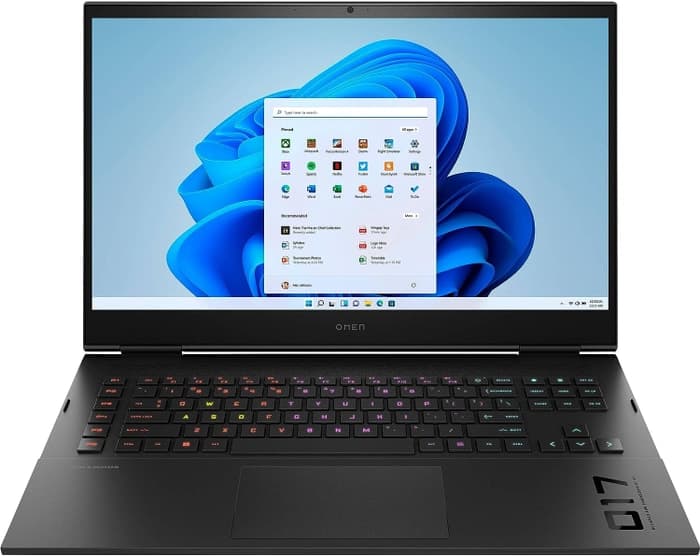
HP Omen
- QHD display with 165 Hz
- Advanced Optimus for improved graphics performance
- Slightly below-average performance for an RTX 4080 laptop
- High noise level
Table of the Best Laptops for family use
| Laptop | Price (approx) |
| acer Nitro 5 | $680 |
| HP Victus 15 | $880 |
| ASUS TUF Dash F15 | $1,160 |
| Lenovo Legion 5i Pro 16 | $1,300 |
| HP Envy 16 | $1,800 |
| Lenovo Legion Pro 7i 16 | $3,390 |
| HP Omen 17 | $4,290 |





